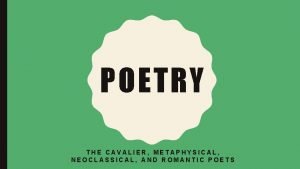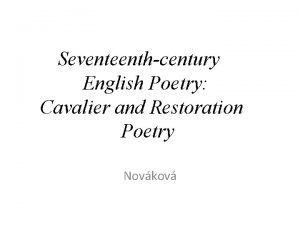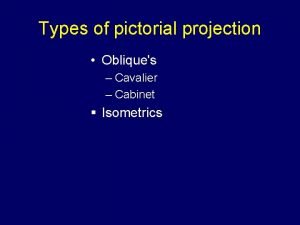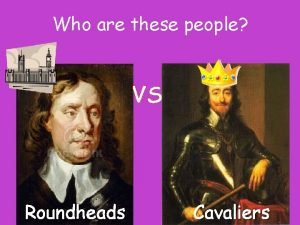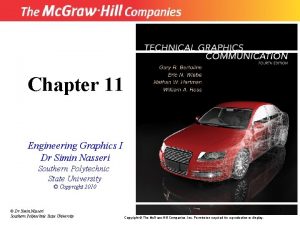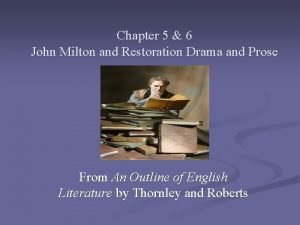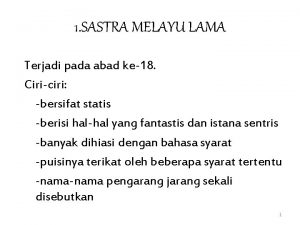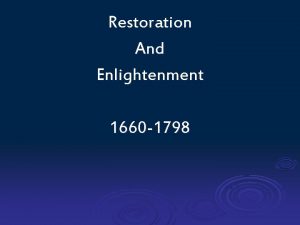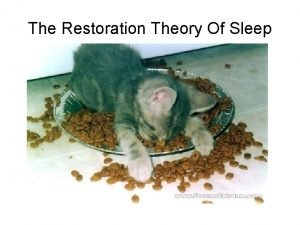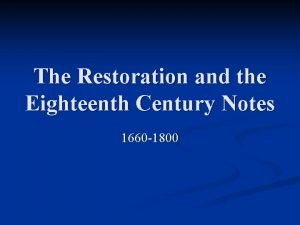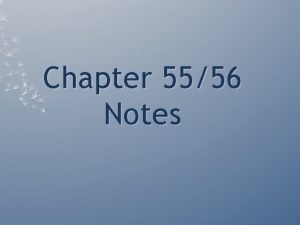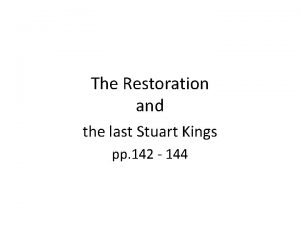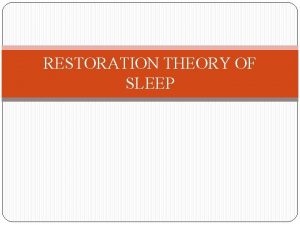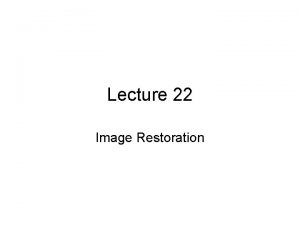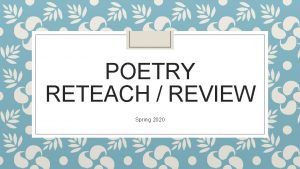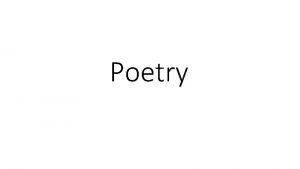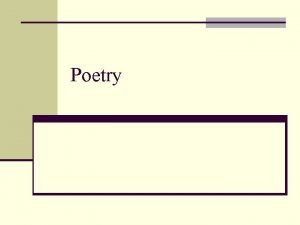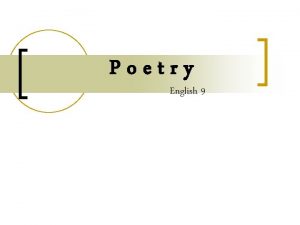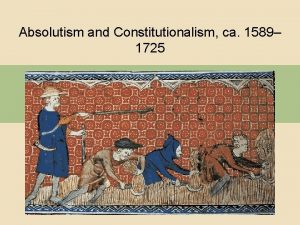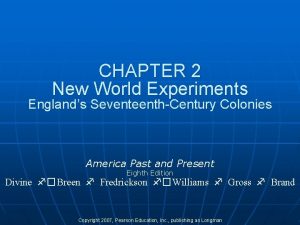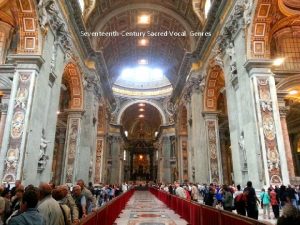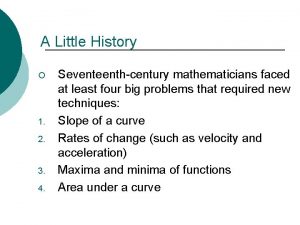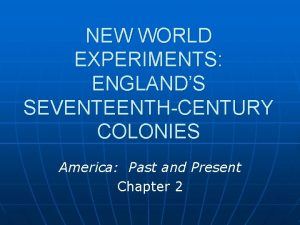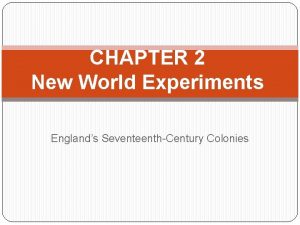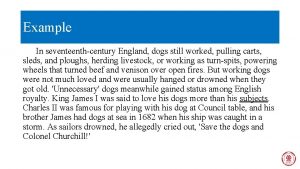Seventeenthcentury English Poetry Cavalier and Restoration Poetry Novkov














![[…] From hence began that plot, the nation's curse, Bad in itself, but represented […] From hence began that plot, the nation's curse, Bad in itself, but represented](https://slidetodoc.com/presentation_image_h/a3c81e4065fff846d714225deadee845/image-15.jpg)

















- Slides: 32

Seventeenth-century English Poetry: Cavalier and Restoration Poetry Nováková

Metaphysical x Cavalier • Stylistic x political • Followers of Donne x the “sons of Ben” • Some both (combine metaphysical wit and conceit with Jonsonian polish): • Thomas Carew, “A Rapture” • Andrew Marvell, “To His Coy Mistress” 2

Jonsonian influence • Robert Herrick, Richard Lovelace, Sir John Suckling • Edmund Waller, • Sir John Denham (balanced “heroic” couplets): O could I flow like thee and make thy stream My great example, as it is my theme. Though deep, yet clear; though gentle, yet not dull; Strong without rage; without o’erflowing full. (from Cooper’s Hill, 1642) 3

Cavaliers • • • Drinking songs Pastorals Anacreon Catullus Carpe diem Retreat, theme of friendship Richard Lovelace (1618 -1657): “The Grasshopper” (1649) Aesop’s fable 4

• • The Grasshopper By Richard Lovelace • To My Noble Friend, Mr. Charles Cotton • • O thou that swing’st upon the waving hair Of some well-fillèd oaten beard, Drunk every night with a delicious tear Dropped thee from heaven, where now th’ art reared; • • The joys of earth and air are thine entire, That with thy feet and wings dost hop and fly; And, when thy poppy works, thou dost retire To thy carved acorn-bed to lie. • • Up with the day, the sun thou welcom’st then, Sport’st in the gilt-plats of his beams, And all these merry days mak’st merry men, Thyself, and melancholy streams. • • But ah, the sickle! Golden ears are cropped; Ceres and Bacchus bid good night; Sharp, frosty fingers all your flowers have topped, And what scythes spared, winds shave off quite. • • Poor verdant fool, and now green ice! thy joys, Large and as lasting as thy perch of grass, Bid us lay in ’gainst winter rain, and poise Their floods with an o’erflowing glass. • • Thou best of men and friends! we will create A genuine summer in each other’s breast, And spite of this cold time and frozen fate, Thaw us a warm seat to our rest. • • Our sacred hearths shall burn eternally, As vestal flames; the North Wind, he Shall strike his frost-stretched wings, dissolve, and fly This Etna in epitome. • • Dropping December shall come weeping in, Bewail th’usurping of his reign: But when in showers of old Greek we begin, Shall cry he hath his crown again! • • Night, as clear Hesper, shall our tapers whip From the light casements where we play, And the dark hag from her black mantle strip, And stick there everlasting day. • • Thus richer than untempted kings are we, That, asking nothing, nothing need: Though lords of all what seas embrace, yet he That wants himself is poor indeed. 5

To Lucasta, Going to the Wars By Richard Lovelace • Tell me not (Sweet) I am unkind, • That from the nunnery • Of thy chaste breast and quiet mind • To war and arms I fly. • True, a new mistress now I chase, • The first foe in the field; • And with a stronger faith embrace • A sword, a horse, a shield. • Yet this inconstancy is such • As you too shall adore; • I could not love thee (Dear) so much, • Lov’d I not Honour more. 6

Sir John Suckling (1609 -1642) • Pose of spontaneity and carelessness • “Natural, easy Suckling” (Millamant in Congreve’s play The Way of the World) 7

– – Song: Out upon it, I have lov’d By Sir John Suckling • • Out upon it, I have lov’d Three whole days together; And am like to love three more, If it prove fair weather. • • Time shall moult away his wings, Ere he shall discover In the whole wide world again Such a constant lover. • • But the spite on’t is, no praise Is due at all to me; Love with me had made no stays, Had it any been but she. • • Had it any been but she, And that very face, There had been at least ere this A dozen in her place. 8

Robert Herrick (1591 -1674) • To the Virgins, to Make Much of Time • • Gather ye rosebuds while ye may, Old Time is still a-flying; And this same flower that smiles today Tomorrow will be dying. • • The glorious lamp of heaven, the sun, The higher he’s a-getting, The sooner will his race be run, And nearer he’s to setting. • • That age is best which is the first, When youth and blood are warmer; But being spent, the worse, and worst Times still succeed the former. • • Then be not coy, but use your time, And while ye may, go marry; For having lost but once your prime, You may forever tarry. 9

Restoration poetry (1660 -1700) • • Political factions Partisan writings Emotional lyric (Epicurean hedonism) and song odes Satire and mock-pastoral John Wilmot, the Earl of Rochester Katharine Philips – revives Neo-Platonism, retreat poetry and topic of female friendship 10

Restoration poetry • • Poetry of politics and criticism Satirical Mock-heroic Irony, ridicule Form of heroic couplet Dissembling, falsehood Restrain the nature of man, competition and desire 11

John Dryden (1631 -1700) • “the Age of Dryden” • Most prolific • Heroic Stanzas to the Glorious Memory of … Oliver Cromwell Late Lord Protector (1659) • Astrea Redux (1660) • Annus Mirabilis (1666) – year of wonders • Poet Laureate and Historiographer General • 1685 – Catholic • 1688 – out of favour with William III of Orange 12

Absolom and Achitophel (1681) • Old Testament story of Kind David and his rebellious son Absolom • King David = King Charles II, Absolom = Duke of Monmouth • Achitophel = the Earl of Shaftesbury • Exclusion Crisis • Popish Plot 1678 – Titus Oates • Petitioners > Whigs; Abhorrers > Tories 13

The Jews, a headstrong, moody, murm'ring race, As ever tri'd th'extent and stretch of grace; God's pamper'd people whom, debauch'd with ease, No king could govern, nor no God could please; (Gods they had tri'd of every shape and size, That god-smiths could produce, or priests devise: ) These Adam-wits, too fortunately free, Began to dream they wanted liberty: 14
![From hence began that plot the nations curse Bad in itself but represented […] From hence began that plot, the nation's curse, Bad in itself, but represented](https://slidetodoc.com/presentation_image_h/a3c81e4065fff846d714225deadee845/image-15.jpg)
[…] From hence began that plot, the nation's curse, Bad in itself, but represented worse. Rais'd in extremes, and in extremes decri'd; With oaths affirm'd, with dying vows deni'd. Not weigh'd, or winnow'd by the multitude; But swallow'd in the mass, unchew'd and crude. Some truth there was, but dash'd and brew'd with lies; To please the fools, and puzzle all the wise. 15

• • • • Of these the false Achitophel was first: A name to all succeeding ages curst. For close designs, and crooked counsels fit; Sagacious, bold and turbulent of wit: Restless, unfixt in principles and place; In pow'r unpleas'd, impatient of disgrace. A fiery soul, which working out its way, Fretted the pigmy-body to decay: And o'er inform'd the tenement of clay. A daring pilot in extremity; Pleas'd with the danger, when the waves went high He sought the storms; but for a calm unfit, Would steer too nigh the sands, to boast his wit. Great wits are sure to madness near alli'd; And thin partitions do their bounds divide: 16

Mac. Flecknoe (publ. 1682) • • Thomas Shadwell (1640 -1692) Mock-heroic style / burlesque Trivial is inflated in lofty style Richard Flecknoe, Irish poet 17

A Satire upon the True-blue Protestant Poet T. S. All human things are subject to decay, And, when Fate summons, monarchs must obey: This Flecknoe found, who, like Augustus, young Was call'd to empire, and had govern'd long: In prose and verse, was own'd, without dispute Through all the realms of Non-sense, absolute. This aged prince now flourishing in peace, And blest with issue of a large increase, Worn out with business, did at length debate To settle the succession of the State: And pond'ring which of all his sons was fit To reign, and wage immortal war with wit; Cry'd, 'tis resolv'd; for nature pleads that he Should only rule, who most resembles me: 18

Shadwell alone my perfect image bears, Mature in dullness from his tender years. Shadwell alone, of all my sons, is he Who stands confirm'd in full stupidity. The rest to some faint meaning make pretence, But Shadwell never deviates into sense. Some beams of wit on other souls may fall, Strike through and make a lucid interval; But Shadwell's genuine night admits no ray, His rising fogs prevail upon the day: 19

Dryden • Translations, e. g. The Aeneid (Virgil), tales of Chaucer • Literary criticism • Prefaces to plays • Samuel Johnson called Dryden “the father of English criticism” • Essay of Dramatic Poesy (1668) 20

Essay of Dramatic Poesy (1668) • Crites – ancients • Eugenius – moderns • Echoes the French quarrel of the ancients and moderns • Lysideus – French drama • Neander – English 21

• To begin then with Shakespeare; he was the man who of all Modern, and perhaps Ancient Poets, had the largest and most comprehensive soul. All the Images of Nature were still present to him, and he drew them not laboriously, but luckily: when he describes any thing, you more than see it, you feel it too. Those who accuse him to have wanted learning, give him the greater commendation: he was naturally learn'd; he needed not the spectacles of Books to read Nature; he look'd inwards, and found her there. 22

• As for Johnson, to whose Character I am now arriv'd, if we look upon him while he was himself, (for his last Playes were but his dotages) I think him the most learned and judicious Writer which any Theater ever had. He was a most severe Judge of himself as well as others. One cannot say he wanted wit, but rather that he was frugal of it. In his works you find little to retrench or alter. Wit and Language, and Humour also in some measure we had before him; but something of Art was wanting to the Drama till he came. He manag'd his strength to more advantage then any who preceded him. You seldome find him making Love in any of his Scenes, or endeavouring to move the Passions; his genius was too sullen and saturnine to do it gracefully, especially when he knew he came after those who had performed both to such an height. Humour was his proper Sphere, and in that he delighted most to represent Mechanick people. 23

• If there was any fault in his Language, 'twas that he weav'd it too closely and laboriously in his serious Playes; perhaps too, he did a little to much Romanize our Tongue, leaving the words which he translated almost as much Latine as he found them: wherein though he learnedly followed the Idiom of their language, he did not enough comply with ours. If I would compare him with Shakespeare, I must acknowledge him the more correct Poet, but Shakespeare the greater wit. Shakespeare was the Homer, or Father of our Dramatick Poets; Johnson was the Virgil, the pattern of elaborate writing; I admire him, but I love Shakespeare. To conclude of him, as he has given us the most correct Playes, so in the precepts which he has laid down in his Discoveries, we have as many and profitable Rules for perfecting the Stage as any wherewith the French can furnish us. 24

Dryden etc. • Will’s Coffee House • Samuel Johnson: • Compared Dryden to Roman Emperor Augustus (quoting words of Horace): • “He found it brick and left it marble. ” 25

Samuel Butler (1612 -1680) • • Royalist anti-Puritan writer Burlesque satire Hudibras (1662 Part I) ten thousand octosyllabic lines a four foot line in couplets to create a jogging, antiheroic effect Theme from Don Quixote Sir Hudibras (Presbyterians) and his servant Ralpho (Independents) 26

Hudibras sallies forth (by William Hogarth) 27

Hudibras • From CANTO I. When civil fury first grew high, And men fell out they knew not why, When hard Words, fealousies, and Fears, Set Folks together by the Ears, And made them fight, like mad or drunk. For Dame Religion as for Punk, Whose honesty they all durst swear for. Though not a man of them knew wherefore : When Gospel-Trumpeter surrounded. With long-ear'd rout to Battel sounded, And Pulpit, Drum Ecclesiastick, Was beat with fist, instead of a stick : Then did Sir Knight abandon dwelling, And out he rode a Colonelling. 28

John Wilmot, Earl of Rochester (1647 -80) • The Merry Gang • Libertine • Today the word means devoid of restraint, spurning norms of religious and moral behaviour sanctioned by society at large; a morally unrestrained and sexually dissolute person. • Restoration - people who adopted and adapted the philosopher Thomas Hobbes as a way of interpreting human conduct. 29

Thomas Hobbes (1588 -1679) • Influence of Francis Bacon (1561 -1626) • Materialism; mechanical operation of the world • The Leviathan (1651) • life is “solitary, poor, nasty, brutish and short” 30

John Wilmot, the Earl of Rochester • the paradox of the perpetual conflict between desire and its fruition • restlessness, dissatisfaction and a sense of incompleteness • poems work by mock-heroic • juxtaposes euphemistic poetic diction and brutal obscenity • revived carpe diem forms and themes, mocked conventions of the pastoral, love poetry, satire. The titles of his poems include: “The Imperfect Enjoyment” “Against Constancy” “Upon Leaving His Mistress” “Fair Chloris in a Pigsty Lay” “The Disabled Debauchee” “Satire against Mankind” 31

The Libertine play by Stephen Jeffreys in 1994, staged at the Royal Court Theatre filmed 2004 (starring Johnny Depp) • https: //www. youtube. com/watch? v=1 y. BRjr. B 2 Ih 4 32
 Nina tpn
Nina tpn Albatross (metaphor)
Albatross (metaphor) Restoration poetry
Restoration poetry Oblique cabinet pictorial
Oblique cabinet pictorial Tubes ppr
Tubes ppr Cavalier projection matrix
Cavalier projection matrix Cabinet oblique pictorial
Cabinet oblique pictorial Oblique pictorial drawing
Oblique pictorial drawing Liaison complète démontable
Liaison complète démontable Cavalier pictorial definition
Cavalier pictorial definition Is ben jonson a cavalier poet
Is ben jonson a cavalier poet Cabinet oblique drawing
Cabinet oblique drawing Roundheads and cavaliers differences
Roundheads and cavaliers differences Cavalier energy
Cavalier energy Cavalier
Cavalier Thomas cavalier-smith
Thomas cavalier-smith Oblique cavalier
Oblique cavalier Restoration drama and prose
Restoration drama and prose Image restoration is to improve the dash of the image
Image restoration is to improve the dash of the image Chapter 56 conservation biology and restoration ecology
Chapter 56 conservation biology and restoration ecology Chapter 55 ecosystems and restoration ecology
Chapter 55 ecosystems and restoration ecology Restoration prose
Restoration prose Image sharpening and restoration
Image sharpening and restoration The restoration and 18th century literature
The restoration and 18th century literature Restoration and enlightenment
Restoration and enlightenment Repair and restoration theory of sleep
Repair and restoration theory of sleep The restoration and the 18th century notes
The restoration and the 18th century notes Polishing of amalgam
Polishing of amalgam Chapter 55 ecosystems and restoration ecology
Chapter 55 ecosystems and restoration ecology Repair renovation and restoration of water bodies
Repair renovation and restoration of water bodies The restoration and the last stuarts
The restoration and the last stuarts Repair theory of sleep
Repair theory of sleep Narrative vs lyric poetry
Narrative vs lyric poetry

